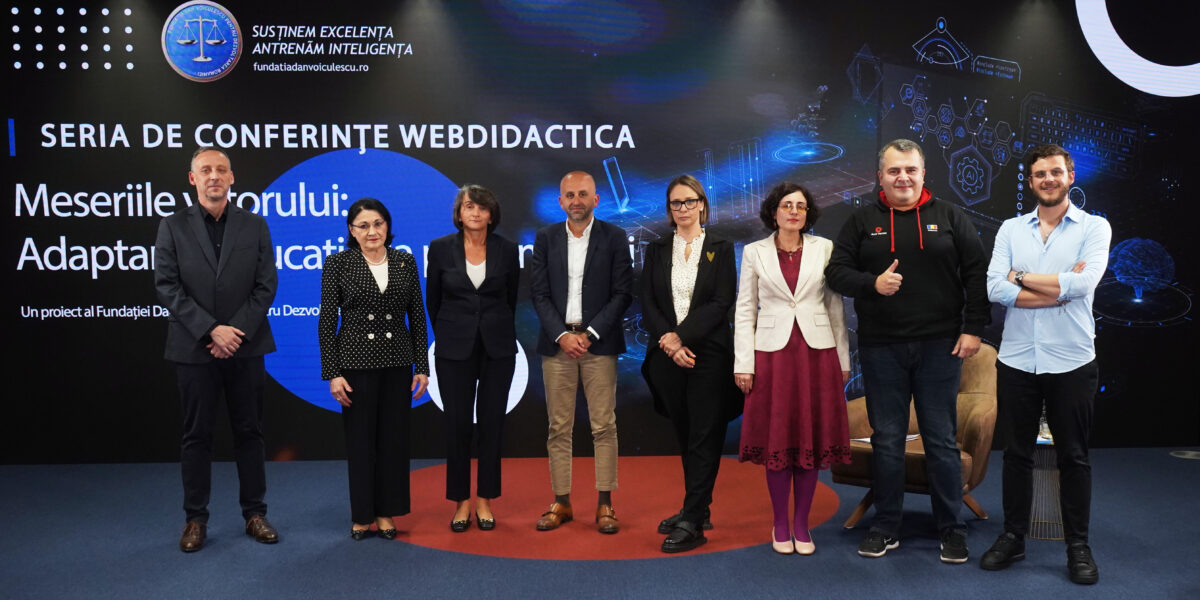The future of the labor market brings both challenges and opportunities, and the Romanian education system requires adjustments to meet contemporary needs. This is the conclusion of the conference "Webdidactics - Jobs of the future, adapting education to the labour market", organized by the Dan Voiculescu Foundation for the Development of Romania. The event brought together a number of educational experts, labor market specialists, teachers and psychologists to address a crucial question: how do we prepare today's generation for tomorrow's jobs?
In the context of a radically changing labour market, the conference participants engaged in a critical examination of the imperative to adapt the school curriculum. Professor Lucian Ciolan, of the University of Bucharest, emphasised that: "Our curriculum should evolve beyond the mere loading of information to be memorised, towards a structure that prioritises the development of critical, reflective and practical thinking skills. We need to devote real space to developing these skills so that young people are truly prepared for the complex challenges of modern society." Professor Ciolan's statement draws attention to a fundamental need: to move away from rote learning in favour of developing skills that will become critical in a changing world.
At the conference, the former Minister of Education, Ecaterina Andronescu, presented a list of prospective professions and the pressing requirements in the field of education. These included the implementation of a differentiated curriculum tailored to the various age groups in schools, the integration of technology, the establishment of a consistent school year structure that aligns with the age of students, and the adoption of an approach to teaching and assessment that prioritises comprehension. Additionally, she emphasised the necessity for regulatory frameworks that facilitate effective communication and collaboration between schools, parents, and educational institutions.
At the Webdididactica 2024 conference, experts highlighted the growing importance of technology in the job market, suggesting that it will fundamentally transform the dynamics of employment. They also emphasised the growing influence of Generation Z, who have been raised in a digital age, in the coming years, noting that they will make up the majority of the workforce and contribute to the accelerated changes currently being observed.
„By 2035, 30% of jobs could be automated, and by 2027, 60% of employees will require training or retraining. The most sought-after skills will be creativity, specific technical and digital skills, AI skills, and knowledge of a foreign language," states Bogdan Badea, CEO of e-Jobs, emphasizing the necessity for robust technological abilities.
Conversely, technological advancement will not only alter the requisite skillset for certain roles, but also the very existence of some positions. Some analysts posit that the current job market may undergo significant transformation.
„The impact of automation and the use of artificial intelligence will be at least as significant and profound as that of mechanisation on agriculture and industrial production.This is according to labour market expert Anca Tamaș, who anticipates a future in which adaptability and lifelong learning will become essential, with some trades disappearing and others being created.
The Webdididactica project, entitled "Professions of the Future - Adapting to the Labour Market", has been designed to provide support for the elaboration of a "Guide to the Professions of the Future". This guide, developed by the Dan Voiculescu Foundation for the Development of Romania, is intended to serve as an educational resource, offering guidance to students, teachers and parents on the emerging trends in professional careers.
The Webdididactica event emphasised the significance of competition and adaptability, two concepts that are crucial in all fields and will assist young people in becoming better prepared for the job market of the future. The experts concluded that competition will enable young people to adapt to the changing landscape, while also acknowledging that change may present challenges. However, they also highlighted that those who are willing to embrace change will have the opportunity to seize new opportunities.
The conference, entitled "Webdidactica - the jobs of the future, adapting education to the labour market", served not only as a forum for discussion but also as a catalyst for a systemic transformation in education, with the objective of equipping young people with the skills required to thrive in an evolving labour market.




















